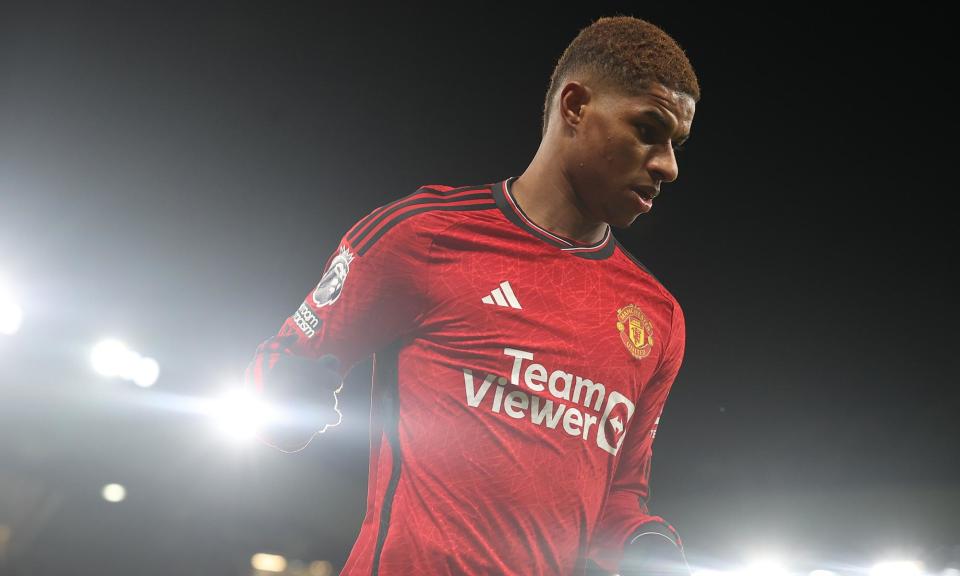Ten Hag’s next move is key as insipid Rashford tests patience to the limits

Marcus Rashford is standing before me on a sun‑buttered afternoon at the University of California in San Diego in July. He is 25, in prime condition, possesses a rare talent and scored 30 goals for his boyhood club the previous term. He is also 13 days into a bumper new £325,000-a-week, five-year contract that places him as Manchester United’s highest earner, and the calm of pre-season offers boundless optimism for the season to come. Yet despite this there is lack of warmth and near‑zero eye contact from Rashford. It is a puzzle.
How a player holds himself is his choice, but Rashford’s demeanour that day now feels like a telling precursor of his current campaign. On the pitch, across 26 appearances, he has largely provided insipid displays and a return of only four goals and five assists. Off the pitch, meanwhile, he was seen celebrating his birthday in a Manchester nightclub on the evening of the 3-0 derby defeat by Manchester City at Old Trafford in October, and on Friday he reported ill for training after allegedly being out the previous night in Belfast.
Related: Marcus Rashford disciplined by Erik ten Hag but could still play against Wolves
Too unwell to be part of the FA Cup win against Newport County on Sunday, Rashford worked instead at United’s Carrington base, the club said. Cue the pondering of how he was robust enough to undertake a training session but not enough to travel to south Wales. An answer may have been offered in Erik ten Hag’s pithy response when asked about the player following victory at Rodney Parade. “He reported ill and the rest is an internal matter,” the manager said. “I will deal with it.”
Here, again, we find the needless yet repeated issue that plagues Ten Hag: a non-football problem and the corollary of having to solve it within the thicket of complications caused by the modern‑day player also being a one‑man corporation. Earlier this season the problem was Jadon Sancho; now it is Rashford, who can afford to charter a private jet to fly in and out of another country for a midweek break and who employs his own PR operation should any smoking gun – such as, for instance, images of a night out in Belfast – subsequently appear.
Ten Hag also has to do all of this while overseeing a listing campaign of uneven results, knowing if Rashford can be kept onside and coaxed to hit top form he may prove key to saving the Dutchman’s job. And all of this is to be navigated in the public glare of being Manchester United manager.
In one sense it should not matter whether Rashford has broken any rules – last Thursday was a day off for all United players – because for the elite athlete what should be at play is the type of cold-eyed focus that drove, say, Cristiano Ronaldo to relentlessly chase perfection during his time at Old Trafford. This is not a moralising stance about whether nightclubs are an apt in-season destination but rather a take on the mantra of self‑motivation and having no regrets given the knowledge that time ticks quickly on a particularly short career.
Why has Rashford, the golden prospect who announced himself under Louis van Gaal across three days in February 2016 by scoring twice on debut against Midtyjlland in a 5-1 Europa League win and twice against Arsenal in a 3-2 Premier League victory, once again lost his mojo? The struggle for consistency is the story of Rashford’s past eight years, as his goal numbers show: eight, 11, 13, 13, 22, 21, five and 30. And how, when losing form, his body language shifts from irresistible force to lost boy.
Ten Hag branded Rashford’s post‑derby birthday excursion to Chinawhite as “unacceptable” and then used the precise same language as he did in Newport: “It is an internal matter.” Here the manager tries to operate as both sergeant‑major disciplinarian and sensitive UN diplomat. As the Sancho episode demonstrated, this can be unviable.
With Sancho, Ten Hag had shown care and patience. The manager allowed him time off last winter to regain fitness and the requisite mindset, and two months before leaving him out of the trip to Arsenal that fractured their working relationship described the forward as emanating a “good vibe”.
Before the Chinawhite and Belfast incidents, Ten Hag was asked numerous times about Rashford’s plunging form. Each time a defence was offered and the player protected, as the prime rule of man-management demands. But all managers lose credibility with the rest of the dressing room when defending a player who has gone clubbing a few hours after being part of a team handed a 3-0 drubbing by their crosstown rivals and, not long after, apparently jetted to Northern Ireland to party at an after-dark venue called Thompsons Garage before reporting unwell for training several hours later.
Ten Hag branded the first as “unacceptable” so we wait to discover his billing of the second. Last year he dropped Rashford from United’s starting side for the New Year’s Eve trip to Wolves. The offence was oversleeping and the player’s reaction was, having come on as a second-half substitute, to score the winner. Afterwards he stated it was a “mistake that can happen”, was “disappointed not to play” and that “I understand” Ten Hag’s decision. It is left to us to decipher if Rashford offered a subtext here.
On agreeing terms on a deal that means he out-earns Casemiro, a five-time European champion, at Old Trafford, Rashford declared the following: “I can assure you that I will give everything to help the team reach the level we are capable of. I couldn’t be more excited for the future under this manager.” A fair question now might be: what is this future and is the manager excited about sharing it with Rashford?

